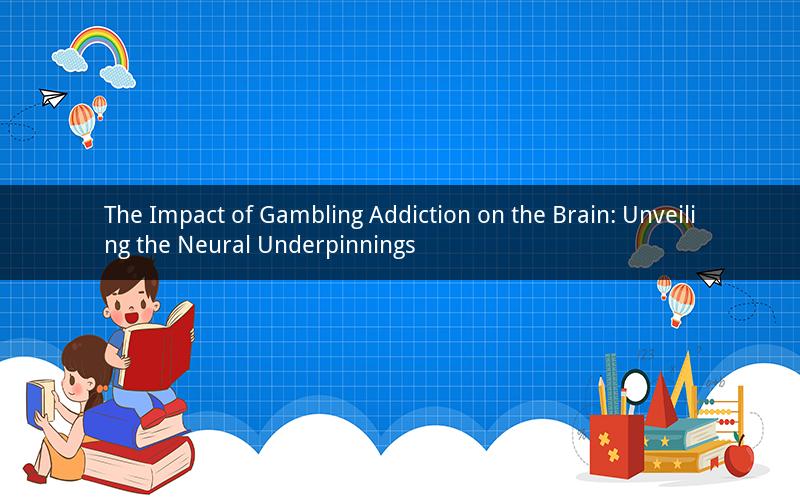
Introduction:
Gambling addiction, a growing concern in today's society, has detrimental effects on individuals and their families. This article delves into the impact of gambling addiction on the brain, exploring the neural mechanisms involved. By understanding the neural changes associated with gambling addiction, we can better comprehend the complexities of this condition and develop effective interventions.
Section 1: The Brain's Reward System
1.1 Dopamine and the Reward Pathway
The brain's reward system plays a crucial role in gambling addiction. Dopamine, a neurotransmitter associated with pleasure and reward, is released when individuals engage in gambling activities. This release creates a sense of excitement and reinforces the desire to continue gambling.
1.2 The Role of Dopamine Receptors
Dopamine receptors in the brain, particularly those in the nucleus accumbens and prefrontal cortex, are highly involved in the development of gambling addiction. These receptors are responsible for transmitting dopamine signals and modulating reward-related behaviors.
Section 2: Brain Changes in Gambling Addiction
2.1 Structural Changes
Research has shown that individuals with gambling addiction exhibit structural changes in various brain regions. The prefrontal cortex, responsible for decision-making and impulse control, often shows reduced gray matter volume. Additionally, the nucleus accumbens, a key area in the reward system, may experience alterations in size and connectivity.
2.2 Functional Changes
Functional changes in the brain's neural circuits are also observed in gambling addiction. The prefrontal cortex, responsible for inhibitory control, may exhibit decreased activity during gambling-related tasks. Conversely, the nucleus accumbens and other reward-related regions may show increased activity, further reinforcing the desire to gamble.
Section 3: Cognitive Impairments
3.1 Decision-Making Impairments
Gambling addiction can lead to cognitive impairments, particularly in decision-making processes. Individuals with gambling addiction may struggle with impulse control, risk assessment, and the ability to weigh potential consequences. This impaired decision-making can exacerbate the addictive behavior.
3.2 Memory and Attention Deficits
Gambling addiction can also impact memory and attention. Individuals with gambling addiction may experience difficulties in remembering important information or maintaining attention during gambling-related tasks. These cognitive impairments can further perpetuate the addictive cycle.
Section 4: Psychological and Social Consequences
4.1 Emotional Distress
Gambling addiction can lead to significant emotional distress, including anxiety, depression, and mood swings. The constant pursuit of gambling and the associated financial and social consequences can take a toll on an individual's mental well-being.
4.2 Family and Social Relationships
Gambling addiction can strain family and social relationships. Financial difficulties, secrecy, and the need to support the addiction can lead to conflicts and a breakdown in relationships. The psychological and social consequences of gambling addiction are multifaceted and can have long-lasting effects.
Section 5: Treatment and Intervention
5.1 Cognitive-Behavioral Therapy (CBT)
Cognitive-Behavioral Therapy (CBT) is an effective treatment for gambling addiction. CBT helps individuals identify and change negative thought patterns and behaviors associated with gambling. By addressing the underlying cognitive factors, CBT can aid in reducing gambling addiction.
5.2 Medication and Support Groups
In some cases, medication and support groups may be beneficial in treating gambling addiction. Medications, such as mood stabilizers or naltrexone, can help manage co-occurring mental health conditions. Support groups provide a platform for individuals to share experiences and receive emotional support.
Section 6: Conclusion
Gambling addiction has profound effects on the brain, impacting neural circuits, decision-making processes, and cognitive functions. Understanding the neural underpinnings of gambling addiction is crucial for developing effective interventions. By addressing both the psychological and social aspects of this condition, individuals can overcome gambling addiction and lead healthier lives.
Questions and Answers:
1. How does gambling addiction affect the brain's reward system?
Gambling addiction affects the brain's reward system by triggering the release of dopamine, a neurotransmitter associated with pleasure and reward. This release reinforces the desire to continue gambling.
2. What are some of the structural changes observed in the brain of individuals with gambling addiction?
Structural changes in the brain of individuals with gambling addiction include reduced gray matter volume in the prefrontal cortex and alterations in the size and connectivity of the nucleus accumbens.
3. Can gambling addiction lead to cognitive impairments?
Yes, gambling addiction can lead to cognitive impairments, particularly in decision-making processes and memory. Individuals with gambling addiction may struggle with impulse control, risk assessment, and attention.
4. What are some of the psychological and social consequences of gambling addiction?
The psychological and social consequences of gambling addiction include emotional distress, such as anxiety and depression, as well as strained family and social relationships.
5. What are some effective treatments for gambling addiction?
Effective treatments for gambling addiction include Cognitive-Behavioral Therapy (CBT), medication, and support groups. CBT helps address negative thought patterns and behaviors, while medication and support groups provide additional support and resources for individuals struggling with gambling addiction.